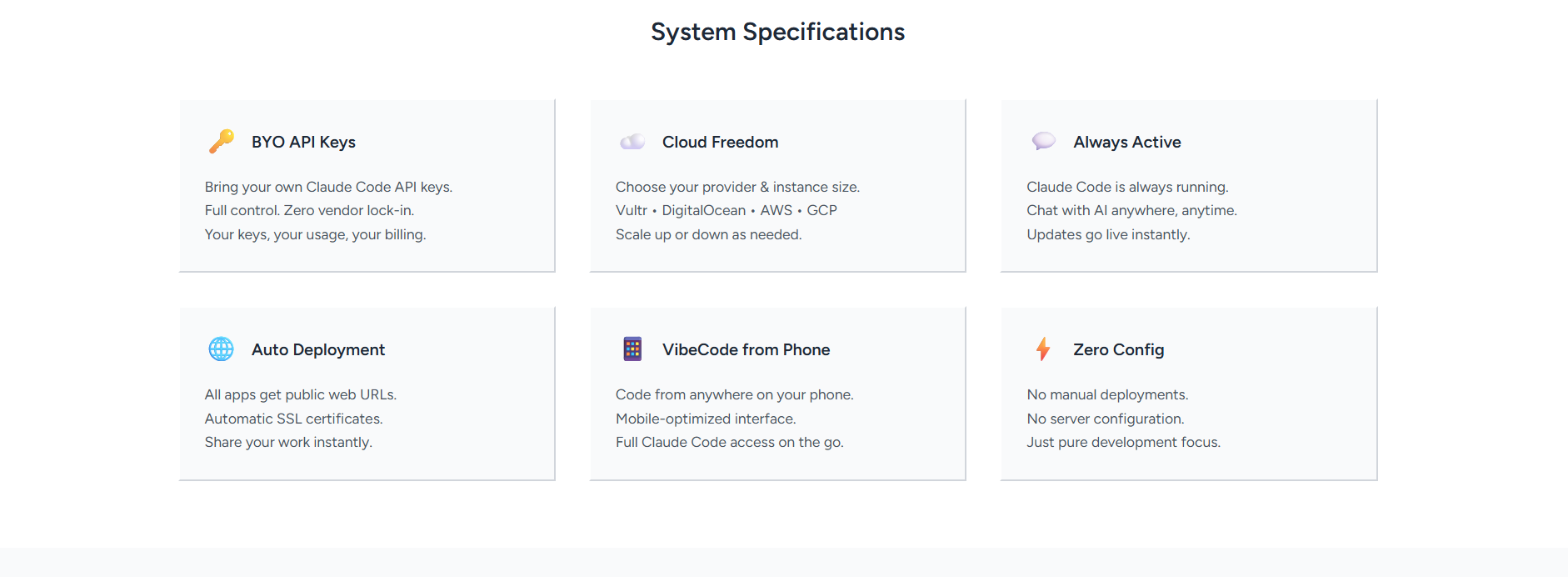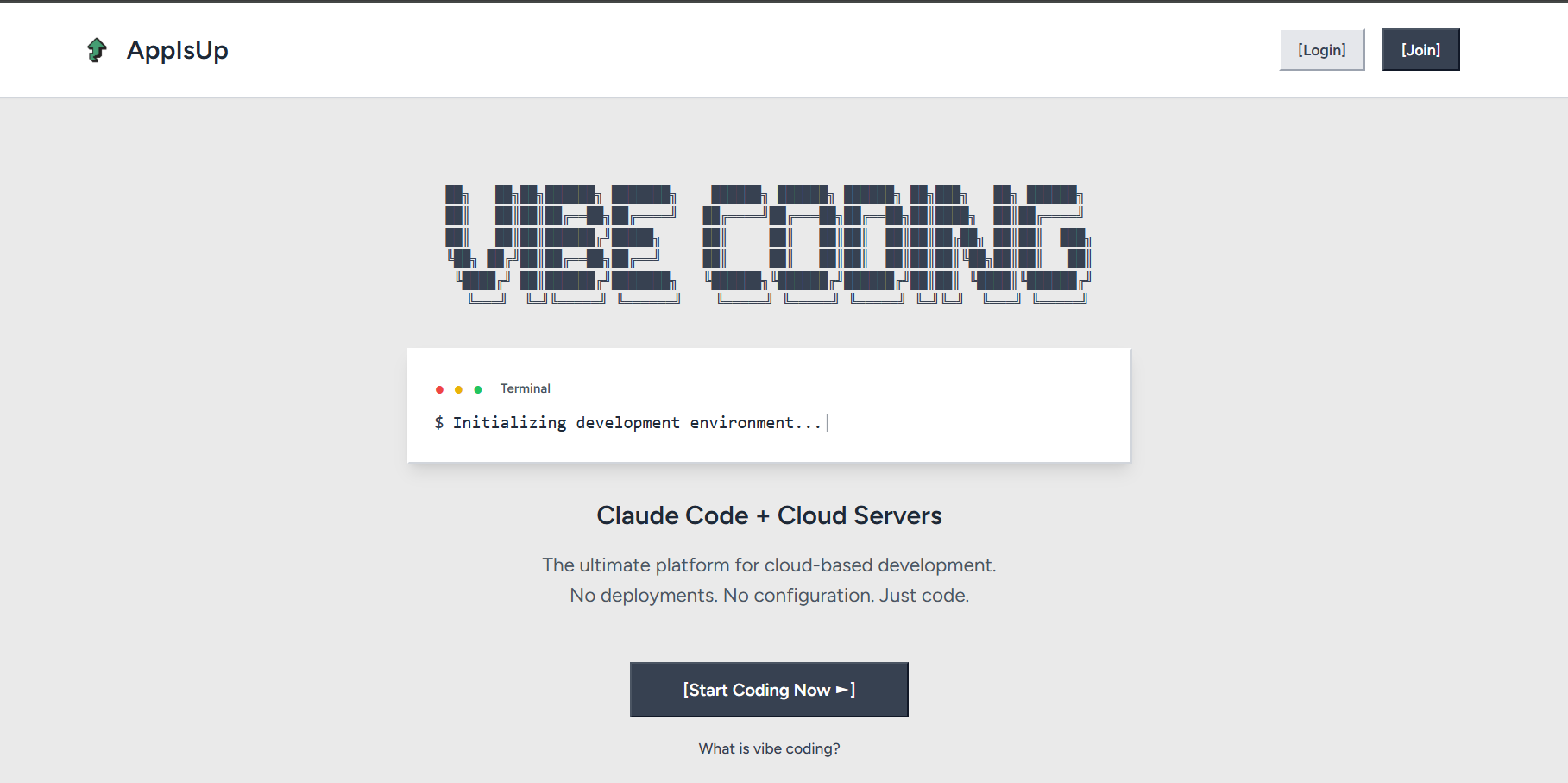
- Indie Developers & Bootstrappers: People who want to build side-projects or prototypes without setting up full infrastructure.
- Web Developers & Front-end Designers: Users who need live environments for testing or showcasing UI / website changes.
- Educators & Coding Bootcamps: Teachers and students wanting immediate feedback, live code sharing, or demonstration tools.
- Hackathon Participants: Teams needing fast setup, sharing, and deployment during short-term events.
- Designers who code: Those who flip between visual design and front-end code and want quick iterations.
- Anyone interested in low friction deployment: Those wanting their changes visible immediately without heavy DevOps overhead.
How to Use It?
- Sign Up / Log In: Create an account and access the dashboard.
- Create New Project: Set up a new repository or workspace.
- Write Code or Import Existing Code: Begin coding in the editor; bring in existing projects if needed.
- Preview & Deploy: Write code, see results live, and get a public URL instantly.
- Collaborate & Share: Invite others to view or edit; share links for feedback or review.
- Monitor & Manage Projects: Use the dashboard to keep track of your apps, versions, activity, usage.
- Instant Public URLs: Makes it very easy to show your work without manual deployment or domain setup.
- AI-Connected Coding Environment: Integration with Claude makes it possible to leverage AI help during development.
- Cloud-Hosted & Live Preview: Code is hosted in the cloud and changes are reflected immediately.
- Low Setup Overhead: Ideal for rapid prototyping, testing, or learning without complex infrastructure.
- Collaboration Friendly: Real-time sharing/review of work makes teamwork or teaching smoother.
- Developer Experience Focused: Aims for minimal friction, so writing, testing, and deploying is as seamless as possible.
- Fast, minimal setup to get code running publicly
- Real-time feedback and collaboration
- Leverage AI (Claude) within the development workflow
- Good for prototypes, demos, lab work, teaching
- Instant public visibility via URLs
- May not be suitable for large or production-scale apps needing reliability, monitoring, or security infrastructure
- Custom backend or third-party integrals may be limited or harder to configure
- Costs, performance, or scaling may become issues as project size grows
- Dependence on platform’s uptime and limitations of the live preview environment
Free
Free
- for a Week.
Starter
$ 15.00
- Monthly Plan
Master
$ 30.00
- Monthly Plan
Proud of the love you're getting? Show off your AI Toolbook reviews—then invite more fans to share the love and build your credibility.
Add an AI Toolbook badge to your site—an easy way to drive followers, showcase updates, and collect reviews. It's like a mini 24/7 billboard for your AI.
Reviews
Rating Distribution
Average score
Popular Mention
FAQs
No — the platform handles hosting and deployment so you can code and see live results without manual server setup.
It is best suited for prototypes, demos, and smaller apps; using it for large-scale production apps may require additional infrastructure or different tools.
Yes — you can share your workspace, project links, and invite others for feedback or joint development.
Yes — each project typically gets an instant public URL so you can show your work or test live.
Yes — the tool connects to Claude, allowing you to get AI assistance integrated into your coding workflow.
Similar AI Tools
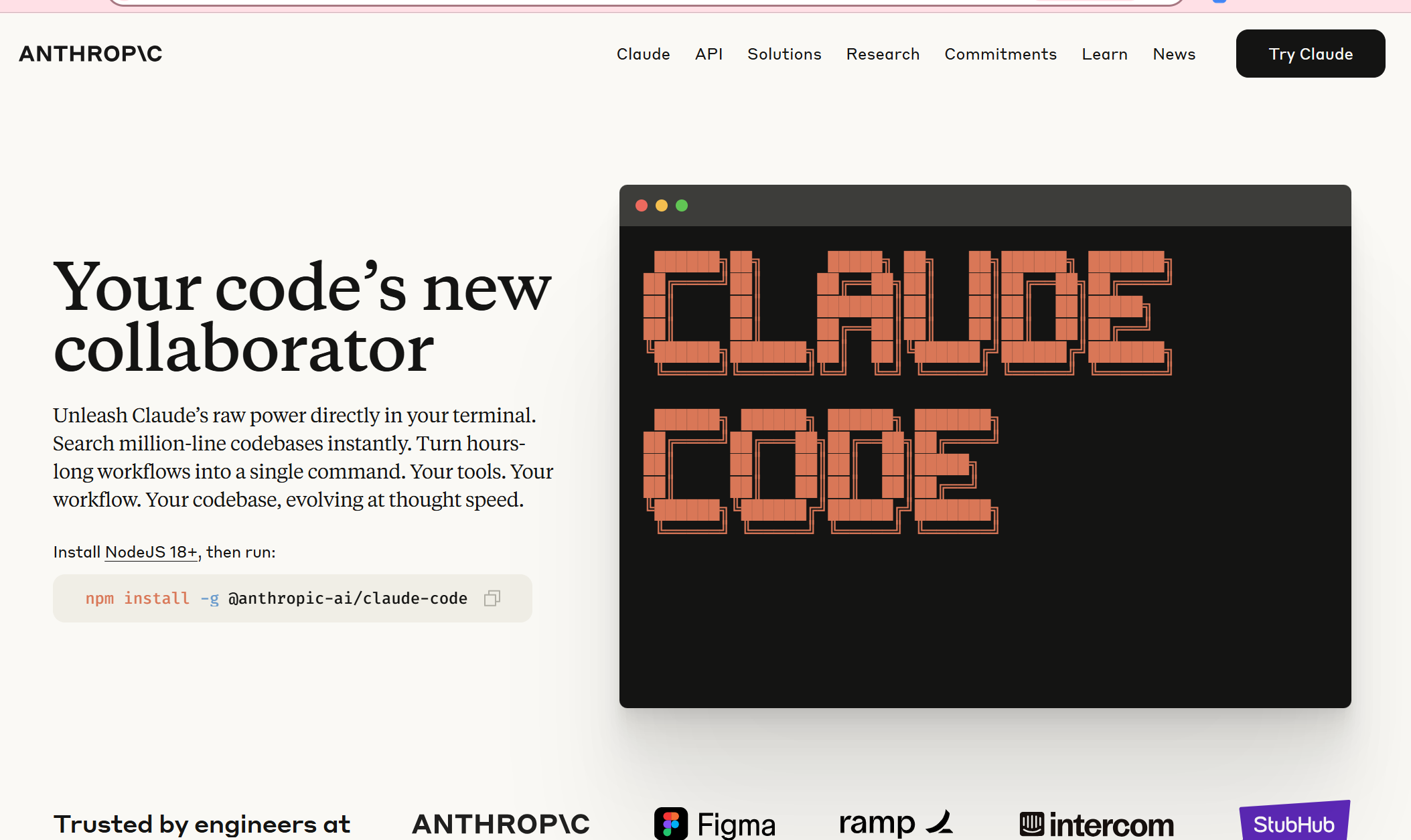
Claude Code
Claude Code is an agentic coding assistant developed by Anthropic. Living in your terminal (or IDE), it comprehends your entire codebase and executes routine tasks—like writing code, debugging, explaining logic, and managing Git workflows—all via natural language commands .

Claude Code
Claude Code is an agentic coding assistant developed by Anthropic. Living in your terminal (or IDE), it comprehends your entire codebase and executes routine tasks—like writing code, debugging, explaining logic, and managing Git workflows—all via natural language commands .

Claude Code
Claude Code is an agentic coding assistant developed by Anthropic. Living in your terminal (or IDE), it comprehends your entire codebase and executes routine tasks—like writing code, debugging, explaining logic, and managing Git workflows—all via natural language commands .

Kiro AI
Kiro.dev is a powerful AI-powered code generation tool designed to accelerate the software development process. It leverages advanced machine learning models to help developers write code faster, more efficiently, and with fewer errors. Kiro.dev offers various features, including code completion, code generation from natural language prompts, and code explanation, making it a valuable asset for developers of all skill levels.

Kiro AI
Kiro.dev is a powerful AI-powered code generation tool designed to accelerate the software development process. It leverages advanced machine learning models to help developers write code faster, more efficiently, and with fewer errors. Kiro.dev offers various features, including code completion, code generation from natural language prompts, and code explanation, making it a valuable asset for developers of all skill levels.

Kiro AI
Kiro.dev is a powerful AI-powered code generation tool designed to accelerate the software development process. It leverages advanced machine learning models to help developers write code faster, more efficiently, and with fewer errors. Kiro.dev offers various features, including code completion, code generation from natural language prompts, and code explanation, making it a valuable asset for developers of all skill levels.
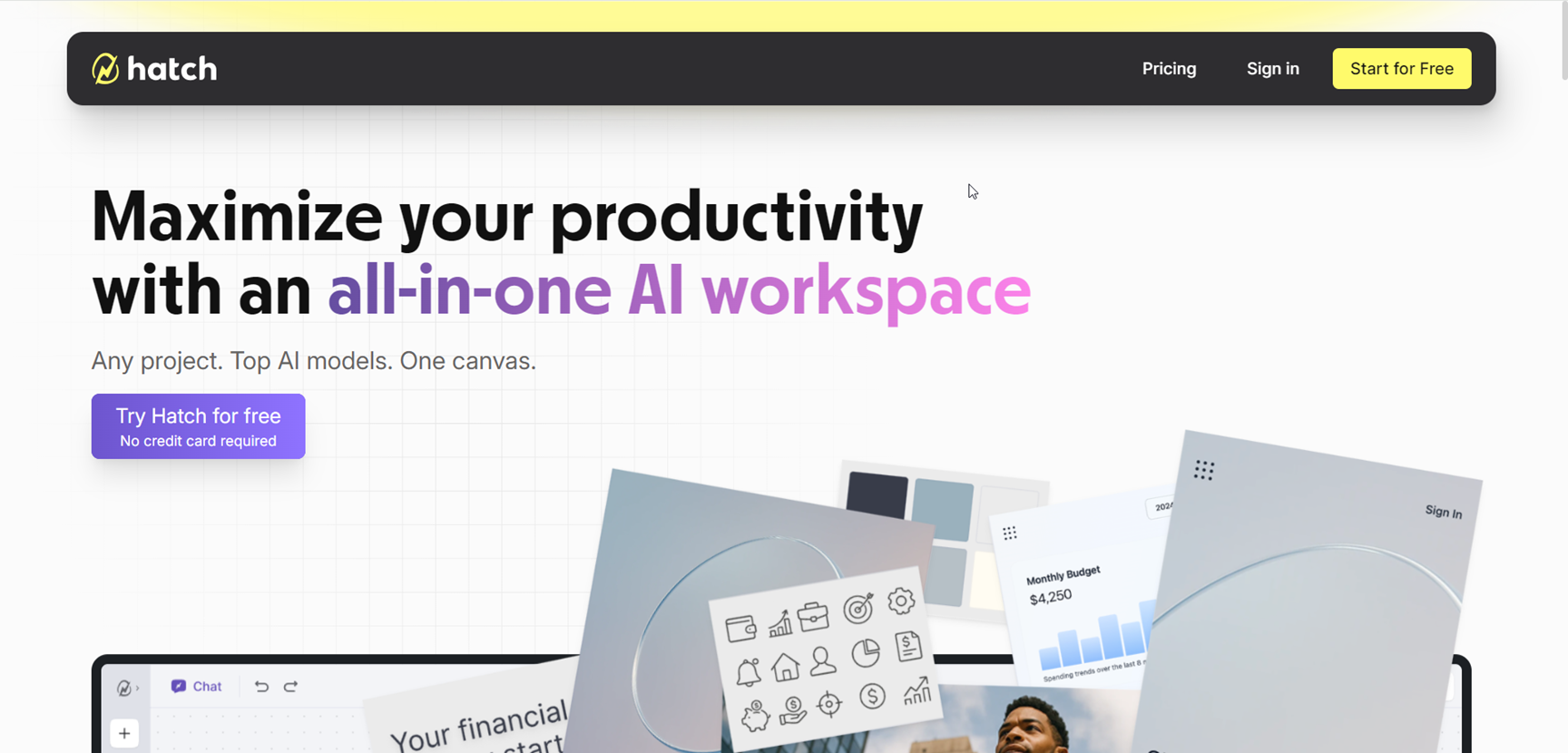
Hatch
Hatch is an all-in-one AI workspace designed to streamline project creation, collaboration, and execution by bringing together documents, images, code, and data on a single canvas. Acting as a unified alternative to juggling ChatGPT, Google Suite, VS Code, and multiple browser tabs, Hatch empowers users to develop quick sketches, code snippets, analysis, and designs without losing context. With multi-model AI integration, Hatch delivers team-level productivity, turning scattered ideas into polished projects, enabling seamless creativity, research, and collaboration—all in one place.

Hatch
Hatch is an all-in-one AI workspace designed to streamline project creation, collaboration, and execution by bringing together documents, images, code, and data on a single canvas. Acting as a unified alternative to juggling ChatGPT, Google Suite, VS Code, and multiple browser tabs, Hatch empowers users to develop quick sketches, code snippets, analysis, and designs without losing context. With multi-model AI integration, Hatch delivers team-level productivity, turning scattered ideas into polished projects, enabling seamless creativity, research, and collaboration—all in one place.

Hatch
Hatch is an all-in-one AI workspace designed to streamline project creation, collaboration, and execution by bringing together documents, images, code, and data on a single canvas. Acting as a unified alternative to juggling ChatGPT, Google Suite, VS Code, and multiple browser tabs, Hatch empowers users to develop quick sketches, code snippets, analysis, and designs without losing context. With multi-model AI integration, Hatch delivers team-level productivity, turning scattered ideas into polished projects, enabling seamless creativity, research, and collaboration—all in one place.
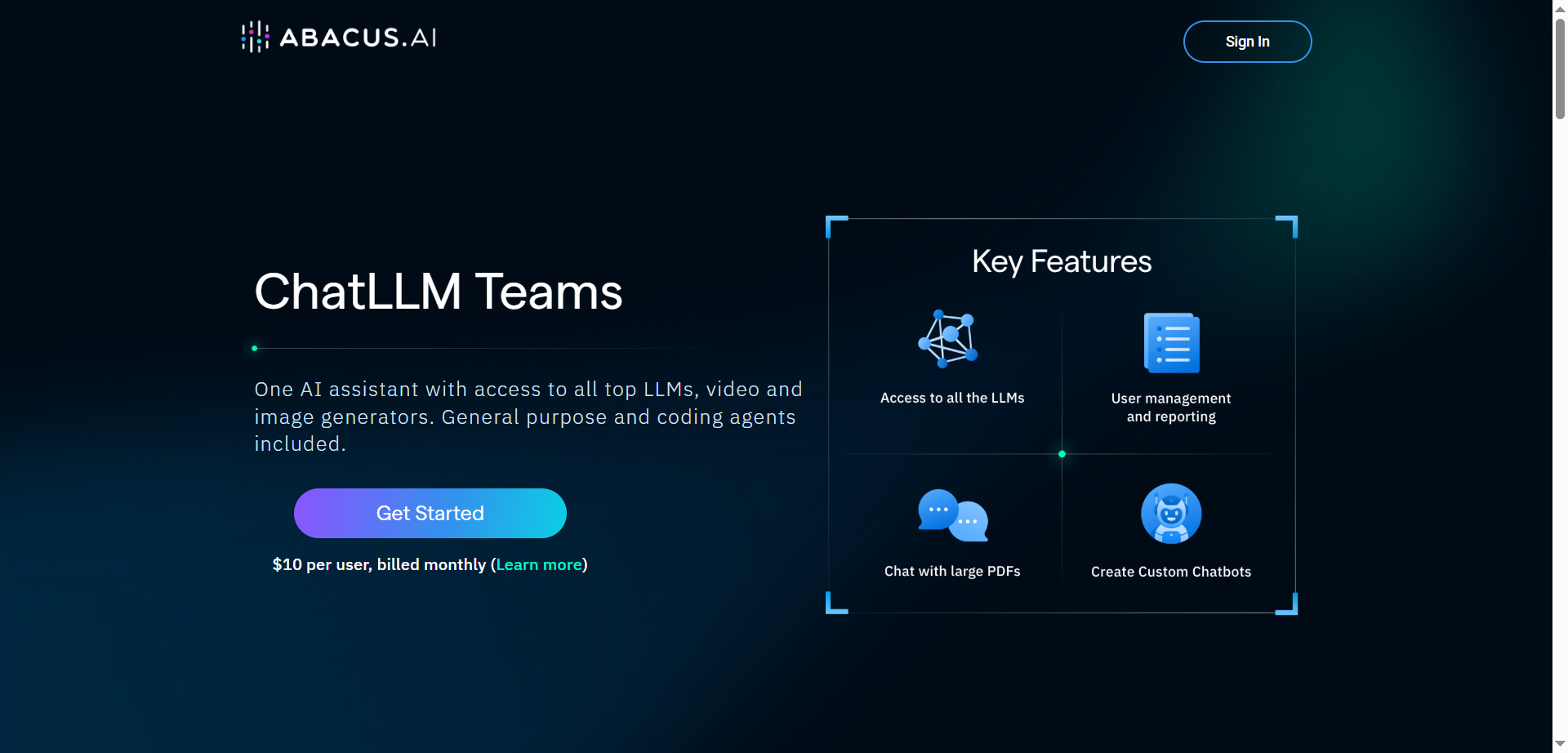
Abacus.AI
ChatLLM Teams by Abacus.AI is an all‑in‑one AI assistant that unifies access to top LLMs, image and video generators, and powerful agentic tools in a single workspace. It includes DeepAgent for complex, multi‑step tasks, code execution with an editor, document/chat with files, web search, TTS, and slide/doc generation. Users can build custom chatbots, set up AI workflows, generate images and videos from multiple models, and organize work with projects across desktop and mobile apps. The platform is OpenAI‑style in usability but adds operator features for running tasks on a computer, plus DeepAgent Desktop and AppLLM for building and hosting small apps.

Abacus.AI
ChatLLM Teams by Abacus.AI is an all‑in‑one AI assistant that unifies access to top LLMs, image and video generators, and powerful agentic tools in a single workspace. It includes DeepAgent for complex, multi‑step tasks, code execution with an editor, document/chat with files, web search, TTS, and slide/doc generation. Users can build custom chatbots, set up AI workflows, generate images and videos from multiple models, and organize work with projects across desktop and mobile apps. The platform is OpenAI‑style in usability but adds operator features for running tasks on a computer, plus DeepAgent Desktop and AppLLM for building and hosting small apps.

Abacus.AI
ChatLLM Teams by Abacus.AI is an all‑in‑one AI assistant that unifies access to top LLMs, image and video generators, and powerful agentic tools in a single workspace. It includes DeepAgent for complex, multi‑step tasks, code execution with an editor, document/chat with files, web search, TTS, and slide/doc generation. Users can build custom chatbots, set up AI workflows, generate images and videos from multiple models, and organize work with projects across desktop and mobile apps. The platform is OpenAI‑style in usability but adds operator features for running tasks on a computer, plus DeepAgent Desktop and AppLLM for building and hosting small apps.
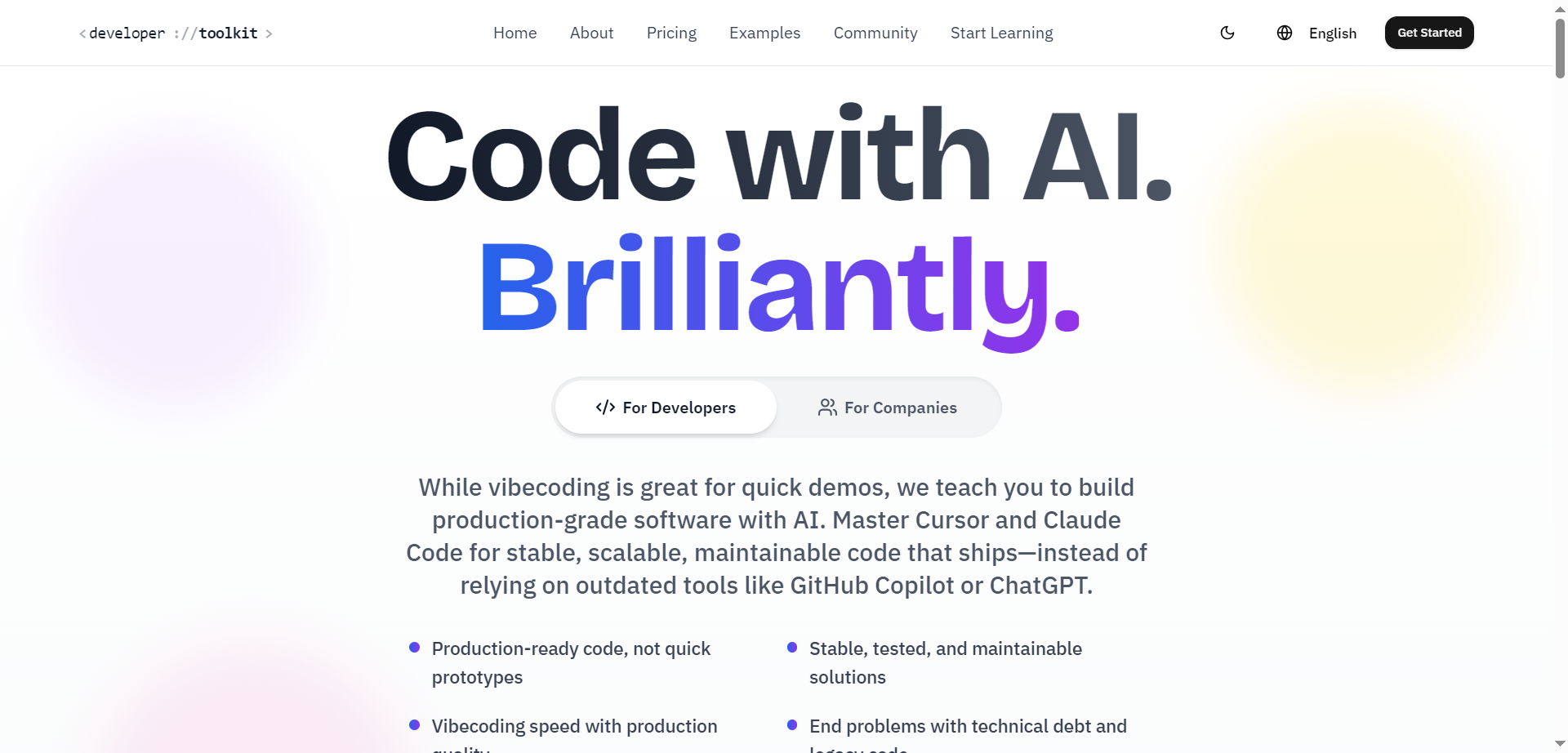
Developer Toolkit
DeveloperToolkit.ai is an advanced AI-assisted development platform designed to help developers build production-grade, scalable, and maintainable software. It leverages powerful models like Claude Code and Cursor to generate production-ready code that’s secure, tested, and optimized for real-world deployment. Unlike tools that stop at quick prototypes, DeveloperToolkit.ai focuses on long-term code quality, maintainability, and best practices. Whether writing API endpoints, components, or full-fledged systems, it accelerates the entire development process while ensuring cleaner architectures and stable results fit for teams that ship with confidence.

Developer Toolkit
DeveloperToolkit.ai is an advanced AI-assisted development platform designed to help developers build production-grade, scalable, and maintainable software. It leverages powerful models like Claude Code and Cursor to generate production-ready code that’s secure, tested, and optimized for real-world deployment. Unlike tools that stop at quick prototypes, DeveloperToolkit.ai focuses on long-term code quality, maintainability, and best practices. Whether writing API endpoints, components, or full-fledged systems, it accelerates the entire development process while ensuring cleaner architectures and stable results fit for teams that ship with confidence.

Developer Toolkit
DeveloperToolkit.ai is an advanced AI-assisted development platform designed to help developers build production-grade, scalable, and maintainable software. It leverages powerful models like Claude Code and Cursor to generate production-ready code that’s secure, tested, and optimized for real-world deployment. Unlike tools that stop at quick prototypes, DeveloperToolkit.ai focuses on long-term code quality, maintainability, and best practices. Whether writing API endpoints, components, or full-fledged systems, it accelerates the entire development process while ensuring cleaner architectures and stable results fit for teams that ship with confidence.
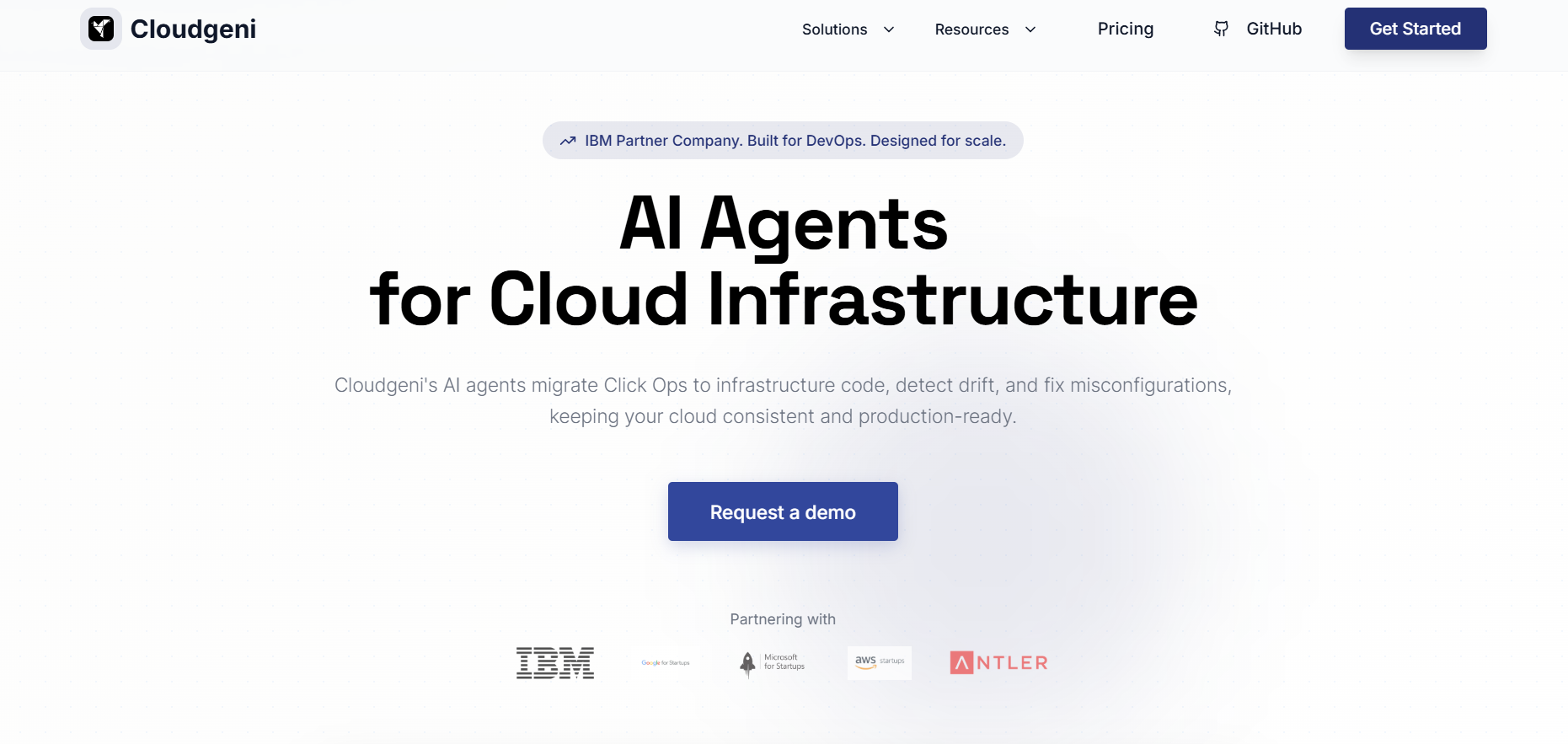

Cloudgen AI
CloudGeni AI is a cloud management and automation platform powered by artificial intelligence. It helps organizations optimize, monitor, and secure cloud infrastructure across multiple providers such as AWS, Azure, and Google Cloud. By using predictive analytics, CloudGeni automates cost control, resource scaling, and security compliance, enabling teams to reduce manual workload and improve operational efficiency. Designed for IT admins, DevOps teams, and cloud architects, it ensures cost transparency and performance reliability for complex cloud ecosystems.


Cloudgen AI
CloudGeni AI is a cloud management and automation platform powered by artificial intelligence. It helps organizations optimize, monitor, and secure cloud infrastructure across multiple providers such as AWS, Azure, and Google Cloud. By using predictive analytics, CloudGeni automates cost control, resource scaling, and security compliance, enabling teams to reduce manual workload and improve operational efficiency. Designed for IT admins, DevOps teams, and cloud architects, it ensures cost transparency and performance reliability for complex cloud ecosystems.


Cloudgen AI
CloudGeni AI is a cloud management and automation platform powered by artificial intelligence. It helps organizations optimize, monitor, and secure cloud infrastructure across multiple providers such as AWS, Azure, and Google Cloud. By using predictive analytics, CloudGeni automates cost control, resource scaling, and security compliance, enabling teams to reduce manual workload and improve operational efficiency. Designed for IT admins, DevOps teams, and cloud architects, it ensures cost transparency and performance reliability for complex cloud ecosystems.
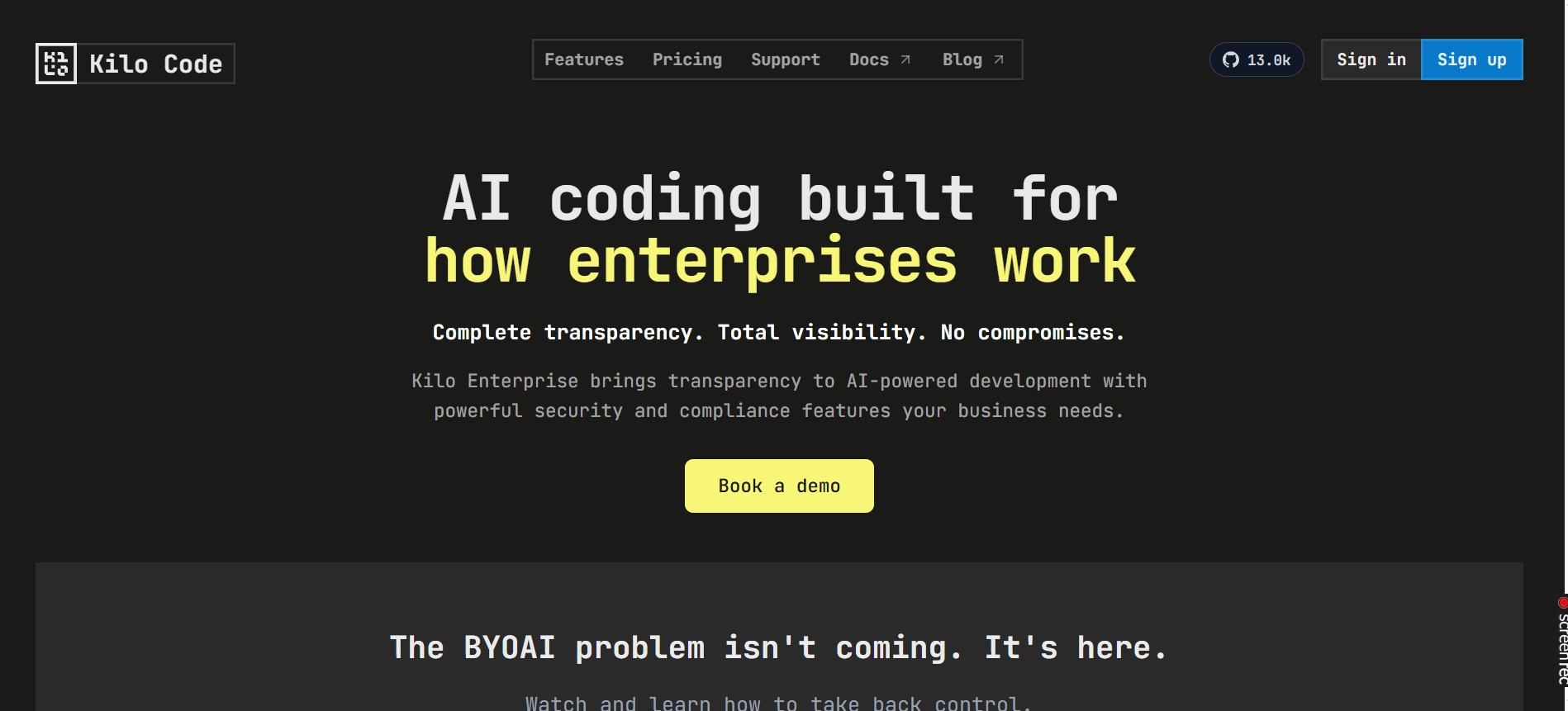
KiloCode Enterprise is a secure, open-source, and fully transparent AI coding platform designed for engineering teams and large organizations that require complete control over their AI development workflow. With robust governance features, private deployment options, audit logs, and model-agnostic flexibility, KiloCode Enterprise empowers teams to use AI coding assistants safely while maintaining compliance, privacy, and full visibility across their organization.


Kilocode-Enterpris..
KiloCode Enterprise is a secure, open-source, and fully transparent AI coding platform designed for engineering teams and large organizations that require complete control over their AI development workflow. With robust governance features, private deployment options, audit logs, and model-agnostic flexibility, KiloCode Enterprise empowers teams to use AI coding assistants safely while maintaining compliance, privacy, and full visibility across their organization.


Kilocode-Enterpris..
KiloCode Enterprise is a secure, open-source, and fully transparent AI coding platform designed for engineering teams and large organizations that require complete control over their AI development workflow. With robust governance features, private deployment options, audit logs, and model-agnostic flexibility, KiloCode Enterprise empowers teams to use AI coding assistants safely while maintaining compliance, privacy, and full visibility across their organization.
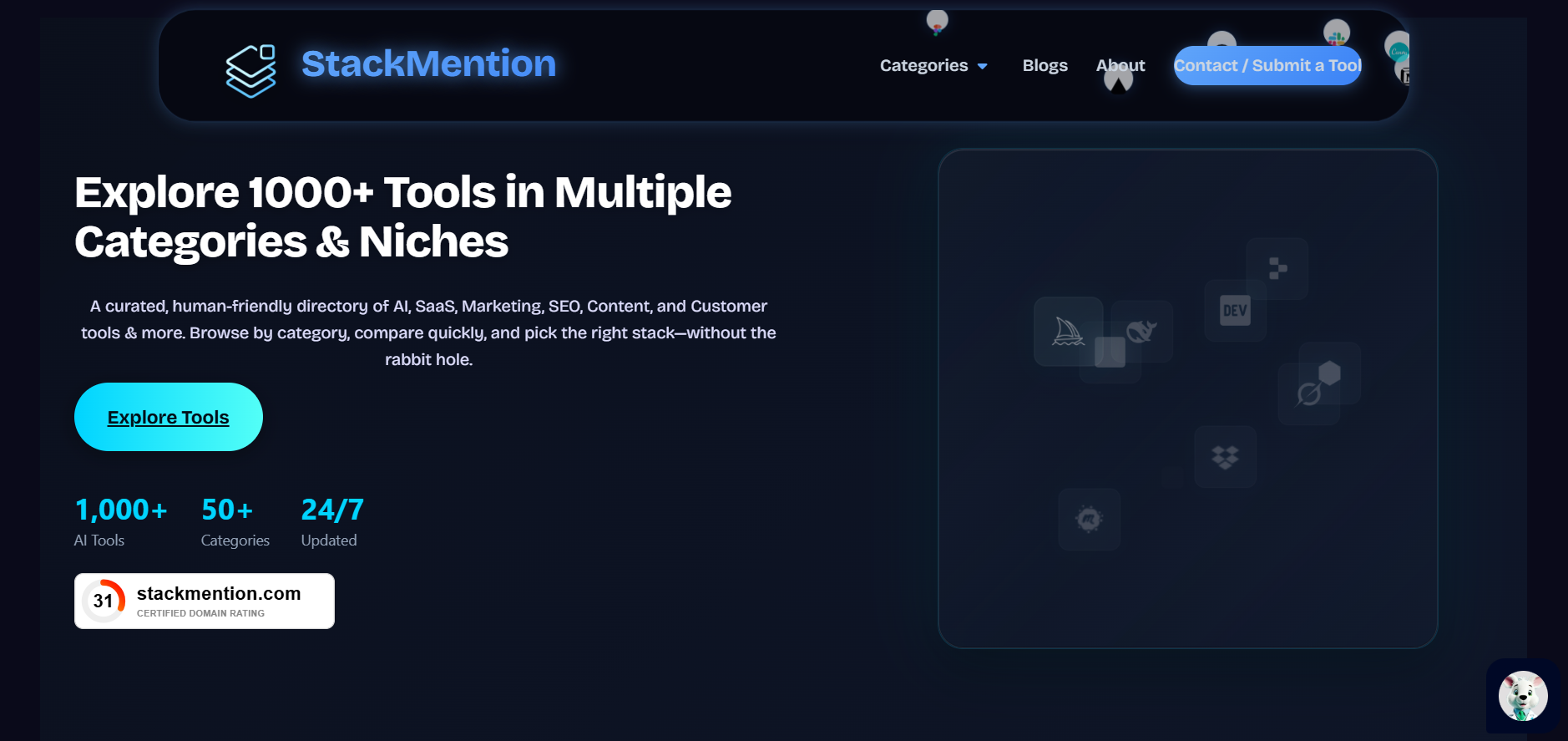

StackMention
StackMention is a curated, human-friendly directory designed to help users discover, compare, and select the right tools across AI, SaaS, Marketing, SEO, Content, Customer Support, and numerous other categories. Instead of navigating scattered websites, confusing lists, or endless search results, StackMention organizes over a thousand tools into clear, easy-to-browse categories and niches. The platform focuses on simplifying exploration so users can identify the best options quickly without falling into research rabbit holes. Each listing highlights core functionality, category placement, and comparative value, enabling users to build or refine their software stack with confidence. StackMention functions as a decision-support hub for creators, entrepreneurs, marketers, and teams looking to evaluate tools efficiently.


StackMention
StackMention is a curated, human-friendly directory designed to help users discover, compare, and select the right tools across AI, SaaS, Marketing, SEO, Content, Customer Support, and numerous other categories. Instead of navigating scattered websites, confusing lists, or endless search results, StackMention organizes over a thousand tools into clear, easy-to-browse categories and niches. The platform focuses on simplifying exploration so users can identify the best options quickly without falling into research rabbit holes. Each listing highlights core functionality, category placement, and comparative value, enabling users to build or refine their software stack with confidence. StackMention functions as a decision-support hub for creators, entrepreneurs, marketers, and teams looking to evaluate tools efficiently.


StackMention
StackMention is a curated, human-friendly directory designed to help users discover, compare, and select the right tools across AI, SaaS, Marketing, SEO, Content, Customer Support, and numerous other categories. Instead of navigating scattered websites, confusing lists, or endless search results, StackMention organizes over a thousand tools into clear, easy-to-browse categories and niches. The platform focuses on simplifying exploration so users can identify the best options quickly without falling into research rabbit holes. Each listing highlights core functionality, category placement, and comparative value, enabling users to build or refine their software stack with confidence. StackMention functions as a decision-support hub for creators, entrepreneurs, marketers, and teams looking to evaluate tools efficiently.
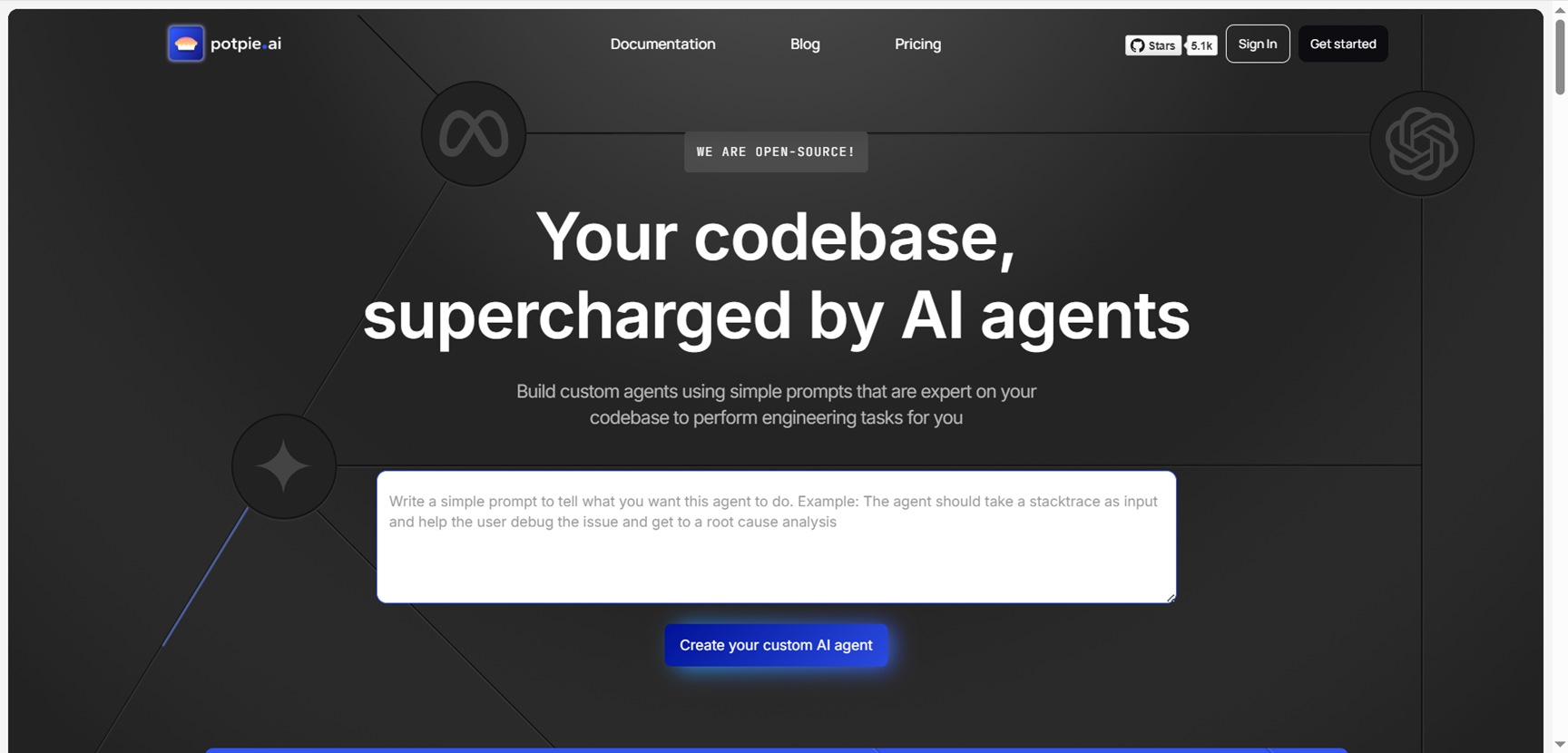

potpie.ai
Potpie.ai is an innovative AI agent platform that enables developers to create intelligent agents for their codebase in just minutes, transforming software development through automated understanding and interaction. Designed specifically for codebase analysis, it allows users to deploy AI agents that comprehend entire repositories, perform tasks like code reviews, bug detection, refactoring suggestions, and feature implementation autonomously. The platform emphasizes speed and simplicity, requiring minimal setup to integrate with existing projects on GitHub or local environments. Key capabilities include natural language queries for code exploration, multi-agent collaboration for complex workflows, and seamless integration with popular IDEs like VS Code. By leveraging advanced LLMs fine-tuned for code, Potpie.ai boosts productivity for solo developers and teams alike, making AI-assisted coding accessible without deep expertise.


potpie.ai
Potpie.ai is an innovative AI agent platform that enables developers to create intelligent agents for their codebase in just minutes, transforming software development through automated understanding and interaction. Designed specifically for codebase analysis, it allows users to deploy AI agents that comprehend entire repositories, perform tasks like code reviews, bug detection, refactoring suggestions, and feature implementation autonomously. The platform emphasizes speed and simplicity, requiring minimal setup to integrate with existing projects on GitHub or local environments. Key capabilities include natural language queries for code exploration, multi-agent collaboration for complex workflows, and seamless integration with popular IDEs like VS Code. By leveraging advanced LLMs fine-tuned for code, Potpie.ai boosts productivity for solo developers and teams alike, making AI-assisted coding accessible without deep expertise.


potpie.ai
Potpie.ai is an innovative AI agent platform that enables developers to create intelligent agents for their codebase in just minutes, transforming software development through automated understanding and interaction. Designed specifically for codebase analysis, it allows users to deploy AI agents that comprehend entire repositories, perform tasks like code reviews, bug detection, refactoring suggestions, and feature implementation autonomously. The platform emphasizes speed and simplicity, requiring minimal setup to integrate with existing projects on GitHub or local environments. Key capabilities include natural language queries for code exploration, multi-agent collaboration for complex workflows, and seamless integration with popular IDEs like VS Code. By leveraging advanced LLMs fine-tuned for code, Potpie.ai boosts productivity for solo developers and teams alike, making AI-assisted coding accessible without deep expertise.
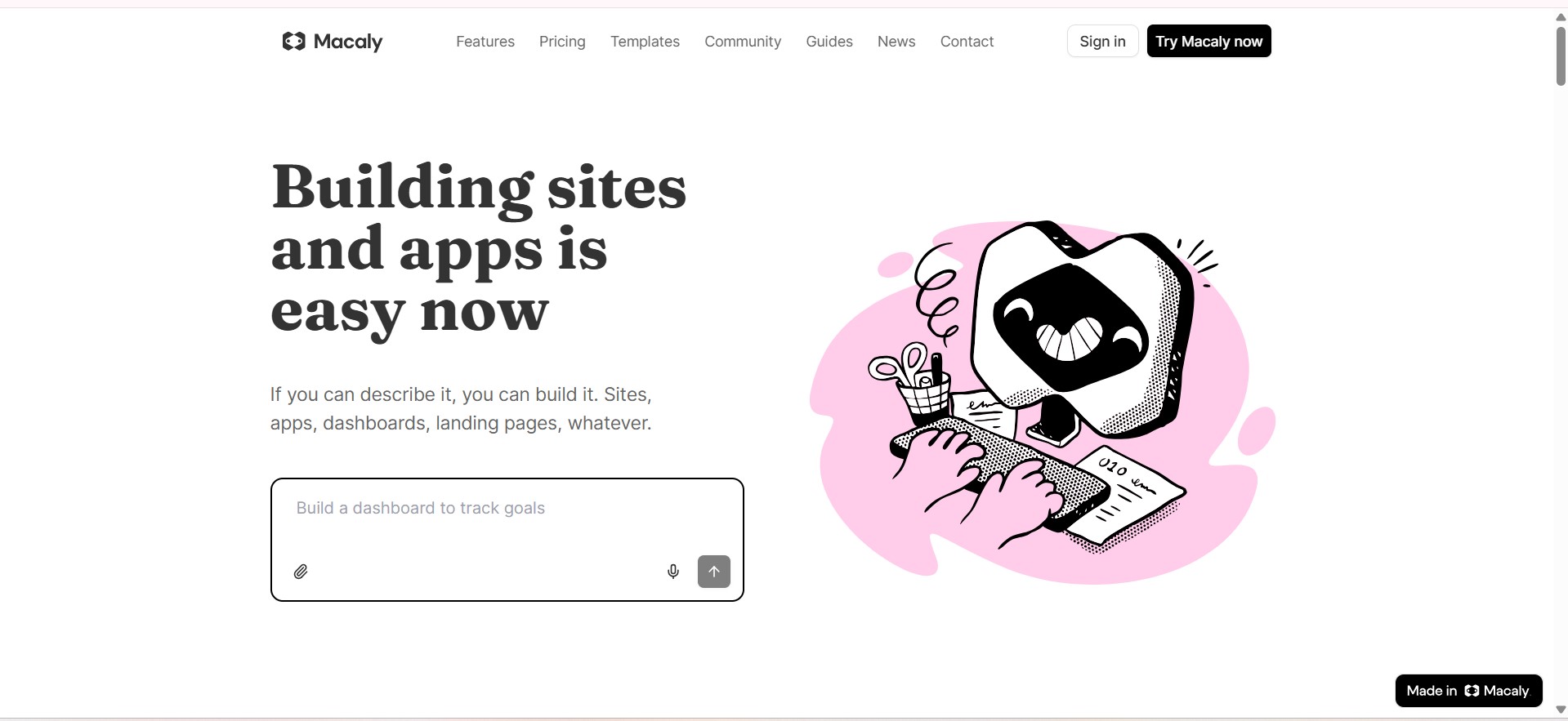

Macaly
Macaly.com is an advanced AI-powered vibe coding platform that lets you create fully functioning websites and applications simply by describing what you want—using natural language (text or voice). It removes the need for traditional coding skills by automatically translating your ideas into live, responsive web projects with SEO, hosting, analytics, and content features built in.


Macaly
Macaly.com is an advanced AI-powered vibe coding platform that lets you create fully functioning websites and applications simply by describing what you want—using natural language (text or voice). It removes the need for traditional coding skills by automatically translating your ideas into live, responsive web projects with SEO, hosting, analytics, and content features built in.


Macaly
Macaly.com is an advanced AI-powered vibe coding platform that lets you create fully functioning websites and applications simply by describing what you want—using natural language (text or voice). It removes the need for traditional coding skills by automatically translating your ideas into live, responsive web projects with SEO, hosting, analytics, and content features built in.
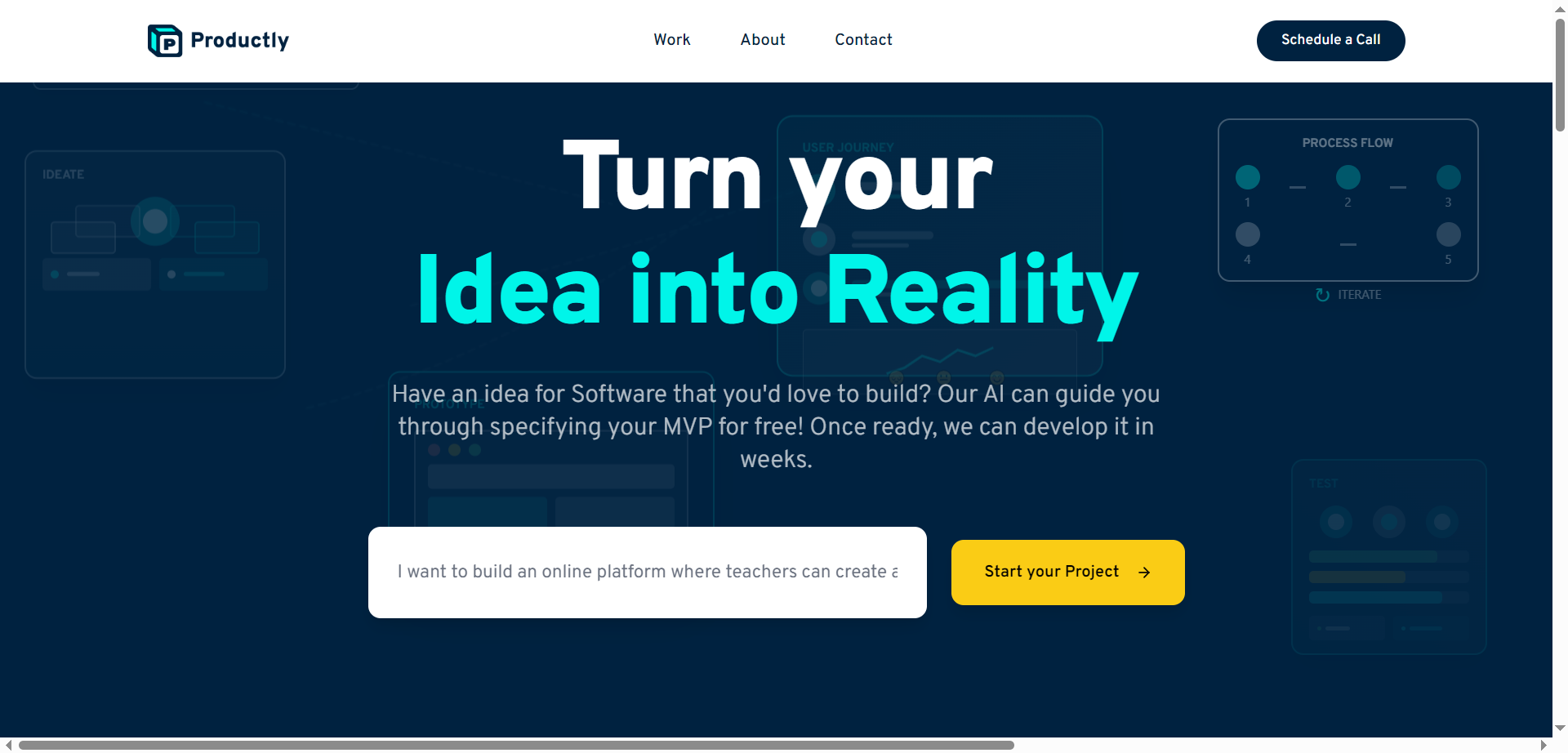

Productly
Productly.dev is a development agency that builds custom software applications using modern no-code and low-code platforms such as Bubble, enabling businesses to design, prototype, and launch digital products — including SaaS platforms, marketplaces, and CRMs — faster than traditional development approaches. The service helps founders and teams translate ideas into functional applications with reduced timelines and development costs by leveraging visual frameworks and rapid deployment tools.


Productly
Productly.dev is a development agency that builds custom software applications using modern no-code and low-code platforms such as Bubble, enabling businesses to design, prototype, and launch digital products — including SaaS platforms, marketplaces, and CRMs — faster than traditional development approaches. The service helps founders and teams translate ideas into functional applications with reduced timelines and development costs by leveraging visual frameworks and rapid deployment tools.


Productly
Productly.dev is a development agency that builds custom software applications using modern no-code and low-code platforms such as Bubble, enabling businesses to design, prototype, and launch digital products — including SaaS platforms, marketplaces, and CRMs — faster than traditional development approaches. The service helps founders and teams translate ideas into functional applications with reduced timelines and development costs by leveraging visual frameworks and rapid deployment tools.
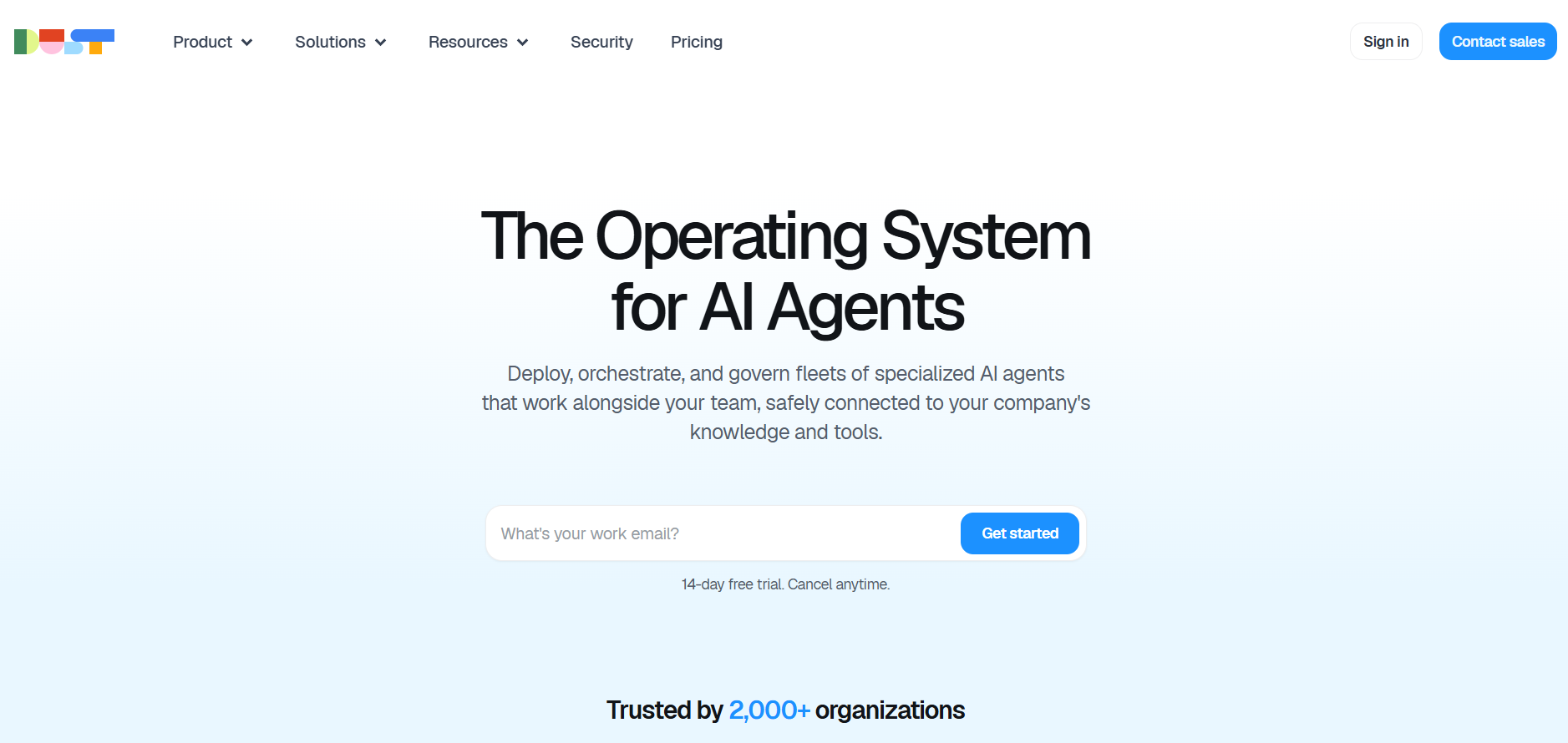

Dust
Dust is an operating system for AI agents, built to help organizations deploy, orchestrate, and govern large fleets of specialized AI agents that work alongside human teams. It integrates directly with a company’s internal knowledge, workflows, and tools, enabling agents to take actions, provide insights, automate tasks, and operate safely within controlled environments. Dust focuses on enterprise-grade security, governance, and interoperability, allowing teams to build and manage multi-agent ecosystems without losing oversight or control. With the ability to connect agents to internal data sources and business processes, Dust turns AI into an operational layer that scales across departments and functions.


Dust
Dust is an operating system for AI agents, built to help organizations deploy, orchestrate, and govern large fleets of specialized AI agents that work alongside human teams. It integrates directly with a company’s internal knowledge, workflows, and tools, enabling agents to take actions, provide insights, automate tasks, and operate safely within controlled environments. Dust focuses on enterprise-grade security, governance, and interoperability, allowing teams to build and manage multi-agent ecosystems without losing oversight or control. With the ability to connect agents to internal data sources and business processes, Dust turns AI into an operational layer that scales across departments and functions.


Dust
Dust is an operating system for AI agents, built to help organizations deploy, orchestrate, and govern large fleets of specialized AI agents that work alongside human teams. It integrates directly with a company’s internal knowledge, workflows, and tools, enabling agents to take actions, provide insights, automate tasks, and operate safely within controlled environments. Dust focuses on enterprise-grade security, governance, and interoperability, allowing teams to build and manage multi-agent ecosystems without losing oversight or control. With the ability to connect agents to internal data sources and business processes, Dust turns AI into an operational layer that scales across departments and functions.
Editorial Note
This page was researched and written by the ATB Editorial Team. Our team researches each AI tool by reviewing its official website, testing features, exploring real use cases, and considering user feedback. Every page is fact-checked and regularly updated to ensure the information stays accurate, neutral, and useful for our readers.
If you have any suggestions or questions, email us at hello@aitoolbook.ai

